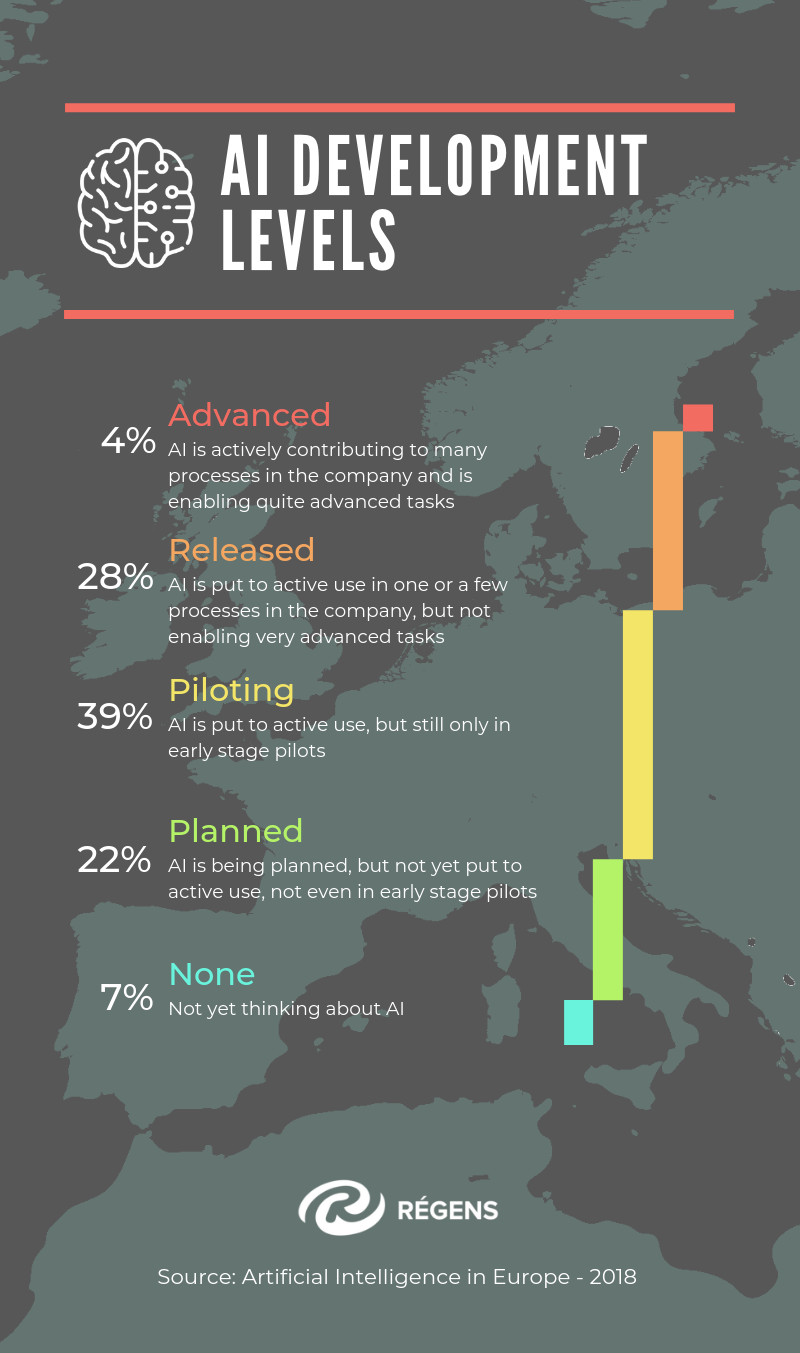The state of AI at Europe’s 277 leading companies in 2019
The state of AI at Europe’s 277 leading companies in 2019
Microsoft in cooperation with Ernst and Young recently published a study about the development and usage level of artificial intelligence at 277 companies from Europe’s 15 largest markets. The study also covers their preferences regarding AI. For an easier and faster understanding, we collected and visualized the most important data of the study to gain a better overview of the state of AI at Europe in 2019.

Which of the following technologies have you found to be most useful in your company’s deployment of AI?
Nowadays, there are several areas and sub-areas of artificial intelligence in existence from deep learning to computer vision. They can all solve different business and social problems, so basically all have their own importance in their own field of application. Nevertheless, the participants of the research have set up a ranking of the relative importance of these technologies in their companies and they have also stated their preferred deployment methods.
The most common technology in the survey was undoubtedly machine learning. This is probably due to the fact that this area of ??AI technologies can be applied in the most varied cases for many specific tasks. Smart robotics has also been found to be of great importance by the interviewed business professionals as they see a great potential for development in this field.
More people use at least partial cloud technologies when deploying an artificial intelligence. The biggest advantage of this is that its capacity can be expanded more easily than in the case of running a dedicated server. However, this may do not comply with the company’s policies. On premise installation is the favoured choice in cases like this.
What are the relevant uses of AI in your company?
At the current state of AI solutions, they can be taught to perform numerous tasks, but according to their functions, they can be classified into 5 main categories: prediction, automation, insight generation, personalization and prescription. The participants of the study were asked to choose the most relevant and useful for their company.
Prediction is the top use
74% of all companies found solutions based on predictions relevant to their activities, which is not surprising, since artificial intelligence provides outstanding performance in prediction tasks. This feature of AI ??can be of great help to companies that have a huge and diverse consumer camp. From appropriately collected and structured data, they can deduce conversion and drop-out rates, classify the generated leads, and have many possibilities for different types of analysis. The forecasts, however, have proved to be very useful and frequent for companies operating with many mechanical equipment. By predicting the maintenance and replacement time of machines, the length of downtime caused by failures can be minimized.
Intelligent automation for effectively dealing with routine tasks
Estimatedly 20-30% of office work consists of recurring tasks that could be solved with the application of a specific artificial intelligence. This is an average that varies by departments and areas of ??activity. For example banking, finance, or HR sectors will benefit more from such solutions since their work can be automated by a greater proportion. Workflows involving the processing of huge amounts of information can also lead to recurring tasks. A trend towards using chatbots and smart personal assistants for such purposes is becoming more and more evident, so we can be sure that these technologies will play an increasing role in the not too distant future.
Generating insights to make informed decisions
A similar field of application is generating insights to support decision-makers. Nonetheless, it requires to filter out not the essence of a content, but the relevant data from the aspect of the decision, which may be a much more difficult task when it comes to training the given AI. As a result, the teaching and processing data used must also be more sophisticatedly structured.
Personalization is becoming a must
The consumer of the future will only respond to messages that have been fully tailored to him. Personalization has so far been a time-consuming and tedious task due to the slowness of information processing. People already share a lot of information with their digital interactions, and the amount of this kind of data will only increase. The interpretation and proper processing of this is the key to effective personalization and AI can offer a great help with this.
Prescriptions’ potential is big
Although only 24% of executives answering the questionnaire felt that the last element on this list was beneficial to their company, the significance of prescriptions is much greater. Basically, anyone who has customer service and wants to fully or partially automate it would benefit from an artificial intelligence that is trained to prescription. This can be reached by creating a database of the responds based on a large number of fixed errors and complaints. New complains are processed by an AI using NLP. It categorises them to a previously created group and then gives an answer to the problem. The importance of using solutions like this will certainly increase as it saves a huge amount of time, not to mention the operating costs of customer service departments.


Maturity of artificial intelligence at the companies of the survey
The 277 companies surveyed had to list their companies in the following groups based on the usage of artificial intelligence solutions in their daily activities. The results reflect the development level of AI at Europe's leading companies. Interestingly, only 10 companies stated that they have advanced use, so only they use artificial intelligence in several processes for solving more complex problems. However, many are already in the piloting and released phase. They are likely to move on to the next phases within a few years. Another interesting result is that 20 companies claimed that they were not in the process of developing AI and, for some reason, they were not planning it in the near future either.
This chart can be encouraging for all managers who have not yet begun to optimize and scale up their activities with artificial intelligence. Leading companies seem to find great potential and expect a lot from different AI solutions, but there is still a lot of work ahead of them.
Source: Microsoft


